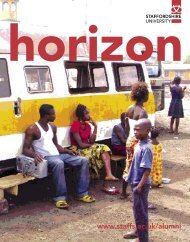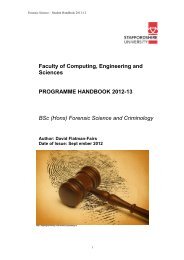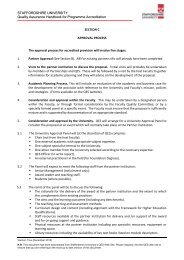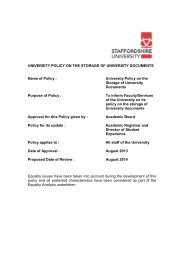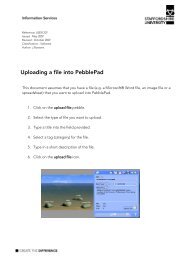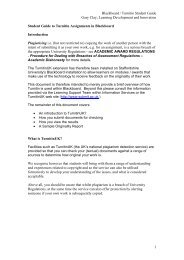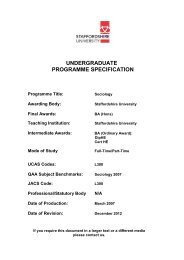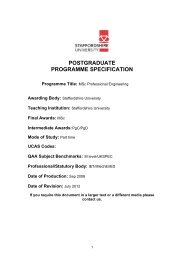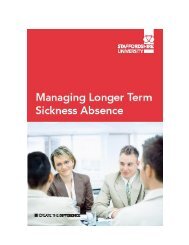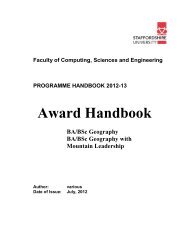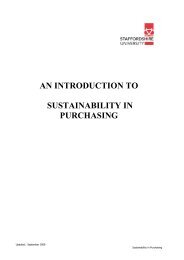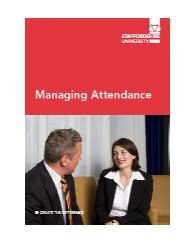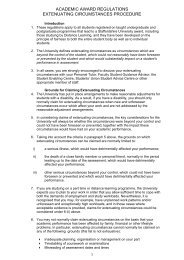DICE Project Final Report Resource Discovery Tools Evaluation and ...
DICE Project Final Report Resource Discovery Tools Evaluation and ...
DICE Project Final Report Resource Discovery Tools Evaluation and ...
Create successful ePaper yourself
Turn your PDF publications into a flip-book with our unique Google optimized e-Paper software.
<strong>DICE</strong> <strong>Final</strong> <strong>Report</strong><br />
retrospect this was beyond us within the project timeline. In fact, <strong>Resource</strong> List services are the<br />
subject of another ELF project (also at Edinburgh University) 3 . Third, it was proposed that<br />
individual reference objects could be generated by selecting from (disaggregating) returned<br />
search results (resource lists) <strong>and</strong> these could be labelled with metadata for re-use. This too was<br />
too ambitious, but an alternative strategy for retrieving resource lists is presented <strong>and</strong> discussed.<br />
The <strong>Evaluation</strong> section is in two parts. The first part describes briefly the nature of the evaluation<br />
of D+ <strong>and</strong> summarizes feedback from the user’s point of view. Evaluators were provided in<br />
advance with the RD <strong>Tools</strong> Guide we had prepared comparing D+ with other discovery services<br />
<strong>and</strong> explaining more of the context (including ‘Advanced Topics’ on integration, metadata <strong>and</strong><br />
protocols). The second part is concerned more with technical issues encountered, especially as<br />
we became aware of these during the integration work. A more detailed submission is being<br />
made separately to the toolkit developers (<strong>and</strong> JISC, available on request).<br />
Integration describes (through more screenshots) the new RD interface developed in COSE <strong>and</strong><br />
the modifications made to the toolkit in saving search results as resource lists. <strong>Resource</strong><br />
<strong>Discovery</strong> services can be ‘launched’ in a separate browser window, using either D+ or Google<br />
Scholar, which is only loosely coupled. The screenshots are taken from our Demonstrator, in<br />
which the user can also do a free text search for resource lists published by other users. The<br />
user can organise lists saved from D+ in folders; they can cut <strong>and</strong> paste lists between folders <strong>and</strong><br />
view a selected list by clicking twice to open a new browser window. Lists are saved as text<br />
components (*_txt.html files) in COSE so can be incorporated into COSE content in the COSE<br />
Editor, <strong>and</strong> treated as any other text component. There are a number of other features we could<br />
add in respect of resource lists in COSE (RLI conformance, dis-aggregation to reference objects,<br />
better integration as full-blown COSE objects) so the work remains ongoing.<br />
Our report finishes with Conclusions. <strong>Project</strong> outputs are referenced here, including the<br />
Demonstrator, <strong>and</strong> a download of COSE bundled with D+, <strong>and</strong> other benefits accruing from the<br />
project listed. There’s a summary of lessons learned <strong>and</strong> how our work in this area might be<br />
progressed further.<br />
3 See the eLearning framework website, http://www.elframework.org/<br />
7



